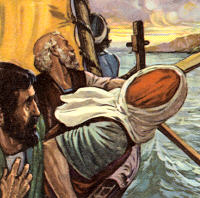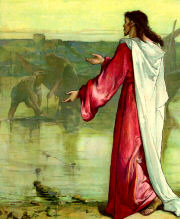We must obey God rather than men. (Acts 5:29)
Is this the same Peter who had denied that he even knew Jesus? Doesn’t it take years—if ever—for us to overcome our fears? Let’s take a look at what happened in Peter to bring about such a transformation.
Spiritual transformation is usually connected to the grace of repentance. Luke tells us that just after Peter denied knowing Jesus three times, “the Lord turned and looked” at him. That look must have broken Peter’s heart, because it moved him to “weep bitterly” (Luke 22:61, 62).
Jesus must have known that those tears would move Peter to repentance, because he told him at the Last Supper, “Once you have turned back, you must strengthen your brothers” (Luke 22:32). He told Peter to use this experience to warn, comfort, and sustain the members of his Church.
In addition to the grace of repentance, Peter received the grace of the Holy Spirit—a grace to help him keep Jesus in the forefront of his mind long after Jesus had ascended into heaven. It was the Holy Spirit, living and active in his heart, who kept encouraging and helping him to stay faithful to the call to obey God, even if it meant disobeying the Jewish elders.
Here’s the good news: what happened to Peter can happen to us. We can be transformed! When we confess our sins, Jesus doesn’t just forgive us. He teaches us how to use our experience of his mercy to comfort and sustain the people around us. And at the same time, he gives us a greater outpouring of his Spirit so that we can find the strength and courage to remain faithful to the Lord and his calling on our lives.
Obeying God’s commands is meant to be a joy, not a burden. If we can learn to rely on God’s grace—both the grace of repentance and the grace of the Holy Spirit—we will be transformed as well.
“Come, Holy Spirit, and change my heart!”
Psalm 30:2, 4-6, 11-13; Revelation 5:11-14; John 21:1-19
Questions for Reflection or Group Discussion
1. In the first reading, we hear these words “So they left the presence of the Sanhedrin, rejoicing that they had been found worthy to suffer dishonor for the sake of the name” (Acts (5:41). Why do you think the apostles were willing to suffer dishonor for Jesus? Would you be willing to suffer dishonor for Him, because you are a Catholic Christian? Why or why not?
2. In the Responsorial Psalm, the psalmist expresses his total confidence and faith that no matter what happens to him, the Lord will be with him and rescue him. His response to this is rejoicing, praise, and thanksgiving? How does your confidence in the Lord’s protection over your life (and your family) compare to the psalmist? What steps can you take to increase your own confidence and faith in the Lord? Can you share any examples of when the Lord rescued you from a difficult situation? What was your response to it?
3. The second reading gives us a glimpse of the celebration of praise and worship that goes on in Heaven. What is your reaction to this scene in Heaven? What do you think is the basis for this celebration? In what ways can we as Catholics share in this heavenly celebration?
4. In the Gospel reading, what do you think was Jesus’ reasons for his questions to Peter? Why the same question three times? Why do you think Peter seemed to be so uncomfortable with Jesus’ questions?
5. If Jesus were to ask you the same question he asked Peter, “Do you love me?”—what would be your action and why?
6. The meditation ends with these words, “Obeying God’s commands is meant to be a joy, not a burden. If we can learn to rely on God’s grace—both the grace of repentance and the grace of the Holy Spirit—we will be transformed as well.” In what ways have you experienced the grace of repentance and the grace of the Holy Spirit? How would you describe the impact it has had on how you live out your Christian walk?
7. Take some time now to pray and ask the Lord Jesus to transform you more and into his image and likeness. Use the prayer at the end of the meditation as a starting point.

 The Gospel is from St. John, 21:1-19, The primary purpose in recounting this appearance of the Risen Christ to his Apostles, was to stress the actual conferring of the Primacy on Peter. From this very first meeting with Christ at the Jordan (Jn. 1:42) the Savior had told him that his name Simon bar-Jonah would be changed to Cephas, which means Rock. Some year or so later, at Caesarea Philippi, this change took place when Christ said to Simon, "You are (Peter) Rock. and upon this Rock I will build my Church . . . and I will give you the keys of the kingdom of heaven" (Matt. 16:18-19).
The Gospel is from St. John, 21:1-19, The primary purpose in recounting this appearance of the Risen Christ to his Apostles, was to stress the actual conferring of the Primacy on Peter. From this very first meeting with Christ at the Jordan (Jn. 1:42) the Savior had told him that his name Simon bar-Jonah would be changed to Cephas, which means Rock. Some year or so later, at Caesarea Philippi, this change took place when Christ said to Simon, "You are (Peter) Rock. and upon this Rock I will build my Church . . . and I will give you the keys of the kingdom of heaven" (Matt. 16:18-19).